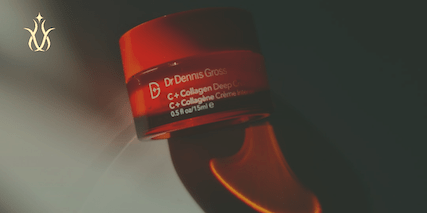Collagen supplements are skyrocketing in popularity as more people seek their numerous health benefits, from enhancing skin elasticity to improving joint health. Our comprehensive guide addresses all your questions about collagen, including detailed explanations of the different types of collagen, how each type supports your body, and what scientific research says about their effectiveness. Additionally, discover tips on what to look for when choosing a collagen supplement and how to incorporate them into your daily routine for optimal health benefits.
Whether you’re a first-timer or looking to better understand your current supplemention regimen, this guide provides all the essential information to make an informed decision.
What is Collagen?
Collagen is the most abundant protein in the body, making up about a third of the body’s protein content. Present in the connective tissue throughout our body, it is one of the major building blocks of muscles, bones, skin, ligaments and tendons. Collagen is also found in many other body parts, including teeth, corneas and blood vessels.
There are at least 16 types of collagen, but the vast majority of the collagen types in the body are types I, II, or III. All collagen molecules are composed of three polypeptide chains arranged in a triple helix, with each chain being a coil itself.
Here are some of the key roles and benefits of collagen:
Structural Support: Collagen fibres provide structure and support to many body parts, including the skin, bones, and connective tissues.
Skin Health: Collagen helps skin to maintain its elasticity and strength. It may also help to promote the production of other essential skin proteins, including elastin and fibrillin.
Joint and Bone Health: Collagen is a key component of cartilage, a rubber-like tissue that protects your joints. With age, the amount of collagen in your body naturally decreases. This risks the development of degenerative joint disorders such as osteoarthritis.
Heart Health: Collagen provides structure to your arteries, the blood vessels that carry blood from your heart to the rest of your body. Without enough collagen, arteries may become weak and fragile.
As we age, our bodies produce less collagen. This can lead to dry skin, the formation of wrinkles, and weaker joint cartilage. Lifestyle factors, such as smoking, a diet high in sugar, and high amounts of sun exposure, can also deplete collagen levels. Consuming foods rich in collagen and taking collagen supplements may help replenish these stores.
Where is Collagen Found?
Collagen is a protein that is found in various parts of the body and in a variety of forms. Its primary role is to provide structural support and strength within connective tissue. Here are some key places where collagen is found:
Skin: The dermis, or middle layer of the skin, contains a large amount of collagen. This helps maintain the skin’s elasticity and strength and aids in replacing dead skin cells.
Bones: Collagen is a major component of bones, providing them with structure and the flexibility they need to withstand stress.
Cartilage: This flexible tissue, found in joints and other parts of the body, is rich in collagen. It cushions joints and allows for smooth movement.
Tendons and Ligaments: These are made mostly of collagen. Tendons connect muscles to bones, while ligaments connect bones to each other. The collagen in these tissues provides the necessary strength and flexibility.
Muscles: Collagen is also present within our muscles, contributing to their structure, strength, and functionality.
Blood Vessels: Collagen helps provide structure to our arteries, veins, and other parts of our vascular system, keeping them strong and elastic.
Eyes: Certain parts of the eye, such as the cornea and the sclera (the white of the eye), have a high concentration of collagen.
Teeth and Gums: Collagen serves as a supporting structure for teeth within the gums and also contributes to the strength of the gums themselves.
Digestive System: Collagen is present in the lining of the gastrointestinal tract, helping to maintain the integrity of the gut lining and support digestive health.
Even though our bodies naturally produce collagen, this production slows down with age, poor nutrition, and stress. This can lead to signs of ageing and various health issues, which is why some people opt for collagen supplementation to support their health.

What Does Collagen Do?
Collagen is a protein that serves numerous important roles throughout the human body due to its unique properties and abundance in connective tissue. It’s often compared to the “glue” that holds everything together. Here’s what collagen does in the body:
Maintains Skin Health: As a key component of the skin, collagen helps to maintain skin elasticity and hydration. It aids in skin cell renewal and repair, contributing to a youthful appearance. With age, collagen production decreases, leading to wrinkles and other signs of aging.
Promotes Joint Health: Collagen is a crucial part of the connective tissues within the joints, including cartilage. It helps maintain the integrity of these tissues, allowing for smooth movement and reducing friction between bones. As collagen levels decrease with age, individuals may experience joint discomfort or conditions like osteoarthritis.
Supports Bone Structure: Your bones are made up largely of collagen, which gives them structure and helps keep them strong. Just as with skin and joints, collagen loss over time can lead to weakened bone structure and issues such as osteoporosis which is a loss of bone mineral density.
Aids Muscle Function: Collagen constitutes a significant portion of muscle tissue and plays a key role in keeping muscles strong and functioning properly. It also plays a role in muscle repair and growth, making it particularly important for athletic performance and recovery.
Supports Heart Health: Collagen helps maintain the structure and integrity of your blood vessels. A lack of collagen can lead to weaker blood vessels, impacting cardiovascular health.
Assists Wound Healing: Collagen plays an important role in wound healing as it serves as a scaffold for new tissue growth. This is why collagen products are often used in medical applications for wound healing and skin repair.
Given its vital functions, it’s understandable why collagen supplements and collagen-rich foods are popular among those looking to support skin, joints, and overall health.
What is Collagen Made Of?
Collagen is a complex protein made up of various amino acids, including glycine, proline, hydroxyproline, and arginine. These are organised into a unique triple helix structure that gives collagen its strength and resilience.
Here’s a more detailed look:
Amino Acids: Collagen is a polypeptide, meaning it’s made of chains of amino acids, which are the building blocks of proteins. Key amino acids in collagen include glycine, proline, hydroxyproline, and arginine. Amino acids combine to form the collagen triple helix structure.
Triple Helix Structure: Three polypeptide chains come together to form a triple helix. Each chain is a coiled structure itself, and these wrap around each other to form the helix. This structure is unique to collagen and gives it its strength and durability.
Vitamin C: While not a component of collagen itself, vitamin C plays a crucial role in collagen production. It helps convert proline and lysine, two amino acids, into hydroxyproline and hydroxylysine, respectively. These are vital for forming the collagen triple helix.
Minerals: Certain minerals like copper and manganese are also crucial for forming and cross-linking collagen fibres, enhancing their strength and stability.
Interestingly, our bodies make collagen naturally, using proteins that we consume in our diet. However, collagen production process slows down with age, which can lead to signs of ageing like wrinkles and joint discomfort. That’s why some people choose to take collagen supplements or consume collagen-rich foods to help support their body’s collagen levels.
How is Collagen Made?
Collagen synthesis is a complex biological process that occurs within the body’s cells. This process involves various stages and components. Here is a simplified explanation of how collagen is made:
Amino Acid Supply: The process begins with the introduction of specific amino acids — mainly glycine, proline, and hydroxyproline — into the body through the diet. These amino acids are the building blocks of collagen.
Vitamin C and Energy: The synthesis of collagen also requires vitamin C. Without enough vitamin C, the body can’t synthesise collagen properly, leading to a range of health issues. Additionally, energy in the form of ATP (adenosine triphosphate) is needed for the process.
Transcription and Translation: The process begins in the cell’s nucleus, where the DNA is transcribed to mRNA (messenger RNA), which is then transported to the ribosome. At the ribosome, this mRNA is translated into a polypeptide chain, a precursor molecule known as pre-procollagen.
Post-Translational Modifications: These polypeptide chains undergo several modifications in the endoplasmic reticulum. The chains are hydroxylated (adding hydroxyl groups to proline and lysine residues) and glycosylated (adding carbohydrate groups), and then three of these modified chains form a triple helix structure, resulting in procollagen.
Transport to Golgi Apparatus: The procollagen is then transported to the Golgi apparatus, another part of the cell, where it is packaged into secretory vesicles.
Secretion and Formation: These vesicles transport the procollagen out of the cell (a process called secretion). Once outside the cell, the procollagen is converted into tropocollagen by specific enzymes that remove the extra peptide ends.
Fibril Formation: The tropocollagen molecules spontaneously arrange into a staggered formation, like aligning bricks in a wall, creating collagen fibrils. These fibrils then aggregate together to form collagen fibres, the final product that gives strength and structure to tissues.
It’s important to note that lifestyle factors such as diet, stress, and sleep can affect the body’s ability to synthesise collagen. Poor nutrition, for example, can lead to an inadequate supply of the necessary amino acids and vitamin C, which can impair collagen production.
Where Does Collagen Come From?
Collagen is a natural protein that is produced by our bodies. However, it can also be derived from various other sources. Let’s explore where collagen comes from:
Within Our Bodies: Our bodies naturally produce collagen. This process involves taking amino acids from the protein-rich foods we eat, such as beef, chicken, fish, beans, eggs, and dairy products. Vitamin C, zinc, and copper also play important roles in this process. Collagen production is mainly by cells within the skin (fibroblasts), bone (osteoblasts), and cartilage (chondroblasts).
Animal Sources: Most collagen supplements on the market are derived from animal sources. Bovine collagen is made from cowhide, bones, and cartilage, while marine collagen is made from fish skin and scales. Bone broth is a particularly rich source of collagen. Chicken collagen is often sourced from chicken sternums. These sources of collagen are typically rich in Type I and Type II collagen, which benefits the skin, bones, and joints.
Plant Sources: While plants do not contain collagen, certain plant foods can help support the body’s production of this essential protein. These include foods rich in vitamin C and the necessary amino acids. Moreover, some products labelled as “plant-based collagen” typically contain these collagen-boosting nutrients rather than actual collagen.

What are Collagen Peptides?
Collagen peptides are small chains of amino acids derived from collagen, a protein that plays a vital role in the structure and health of our skin, hair, nails, joints, and connective tissues. They’re also known as hydrolyzed collagen or collagen hydrolysate.
The process of hydrolysis breaks down collagen into smaller, more easily digestible peptides. These peptides are biologically active and highly bioavailable, meaning they can be absorbed rapidly by the body. Once absorbed, collagen peptides travel throughout the body, repairing, rebuilding, and providing energy.
They can stimulate cells in the skin, bones, and connective tissues, leading to increased collagen production. This can help improve skin elasticity and hydration, strengthen hair and nails, support joint health, and enhance bone density.
It’s worth noting that collagen peptides are tasteless and odourless, which makes them easy to mix into hot or cold beverages, soups, smoothies, or even baked goods. Therefore, they’ve become a popular supplement in nutrition and beauty routines. As always, choosing high-quality, sustainably sourced collagen peptides is crucial for the best results.
Where Does Collagen Come From in Supplements?
Oral collagen supplements are derived from an array of animal-based sources. This is due to the fact that collagen is an abundant protein present in the connective tissues of most animals. Let’s delve into the origins of collagen found in supplements:
Bovine Collagen: This type of collagen is typically extracted from the hides and bones of cows. It is a rich source of Type I and Type III collagen, which are known to support skin, hair, nail, and bone health.
Marine Collagen: Marine, or fish, collagen is derived from the skin, scales, and bones of fish, often sourced from the by-products of the fishing industry. It’s primarily made up of Type I collagen and is highly bioavailable, meaning the body easily absorbs it.
Porcine Collagen: Derived from pigs, porcine collagen is often sourced from the pork skin and bones. It contains Type I and Type III collagen primarily and is often used due to its similarity to human collagen, aiding its absorption and effectiveness.
Chicken Collagen: Chicken collagen is typically harvested from the cartilage in chicken sternums and is a leading source of Type II collagen. This type is particularly beneficial for joint and cartilage health.
Eggshell Membrane Collagen: Some collagen supplements are derived from the membranes of eggshells, known to contain Types I, V, and X collagen. These types are associated with a variety of health benefits, including supporting joint health and the formation of scar tissue.
When choosing a collagen supplement, it’s important to ensure the product comes from a reliable, high-quality source. Always opt for products that have undergone rigorous testing for purity and potency, and where possible, choose brands that prioritise sustainable and ethical sourcing practices.
What is the scientific evidence supporting the use of collagen supplements?
The scientific evidence supporting the use of collagen supplements is derived from several randomized controlled trials and systematic reviews. Hydrolyzed collagen supplementation has been shown to promote skin changes such as decreased wrinkle formation and increased skin elasticity, hydration, and collagen density, which are associated with aging-related skin damage.
Oral collagen supplementation has also been found to increase skin elasticity, hydration, and dermal collagen density, with generally safe use and no reported adverse events.
A systematic review and meta-analysis have provided evidence that hydrolyzed collagen supplementation is effective in reducing skin aging, as it reduces wrinkles and improves skin elasticity and hydration.
In terms of dosage, studies have used varying amounts of collagen hydrolysate, ranging from 2.5g/d to 10g/d, for periods of 8 to 24 weeks. Collagen tripeptide at a dosage of 3g/d for 4 to 12 weeks has also been reported to improve skin elasticity and hydration.
Additionally, the ingestion of bioactive collagen hydrolysates has been shown to enhance facial skin moisture and elasticity and reduce facial aging signs.
For joint health, collagen peptide supplementation has been associated with improvements in pain and function, and when paired with resistance training, it may improve body composition and strength.
Collagen peptides combined with vitamins and other bioactive compounds have been reported to improve skin elasticity and have a beneficial effect on joint and general wellbeing.
What are the Best Collagen Supplement Brands?
Ancient + Brave: Known for its “True Collagen”, which is a pure, sustainably sourced collagen supplement free of any additives.
MyProtein: Their collagen powder is a simple, convenient way to supplement your diet with collagen. It’s unflavoured, so you can add it to any drink or food.
Edible Health: Provides premium, high-strength (13,000mg/serving) bovine collagen with no additives or flavourings.
Planet Paleo: Planet Paleo sources its collagen from pasture-raised cows. Their Pure Collagen powder is highly bioavailable and easily mixed into foods and drinks.
Proto-col: Proto-col offers a range of collagen products, including capsules, powders, and skincare products. They use bovine collagen in their supplements, sourced from pasture-raised cattle.
Revive Collagen: This brand offers hydrolysed marine collagen in easy-to-consume drink sachets. Their collagen is sourced from wild, sustainably caught Atlantic cod.
Vital Proteins: This brand is well-known for its high-quality collagen products, which are sourced from grass-fed, pasture-raised bovine hide. Their Collagen peptide powder is particularly popular and is easily mixed into foods and beverages.
Ancient Nutrition: Ancient Nutrition offers a variety of collagen supplements, including their popular Multi Collagen Protein. They source their collagen from grass-fed beef, cage-free chickens, wild fish, and eggshell membranes.
Sports Research: Sports Research offers a highly-rated collagen supplement that includes Types I, II, III, V, and X collagen derived from grass-fed bovines, wild-caught fish, cage-free chickens, and eggshell membranes. Their product is third-party certified by the Paleo & Keto Foundation.
It’s worth noting that while these brands have been highly reviewed and are reputable, it’s important to consult with a healthcare provider before starting any new supplement regimen, as individual health needs and responses to supplements can vary.
Resources:
Jhawar N et al (2020). Oral collagen supplementation for skin aging: A fad or the future? Available at: https://pubmed.ncbi.nlm.nih.gov/31411379/
Maia Campos PMBG et al (2021). Oral Supplementation with Hydrolyzed Fish Cartilage Improves the Morphological and Structural Characteristics of the Skin: A Double-Blind, Placebo-Controlled Clinical Study. Available at: https://pubmed.ncbi.nlm.nih.gov/34443468/
Kviatkovsky SA et al (2022). Collagen peptide supplementation for pain and function: is it effective? Available at: https://pubmed.ncbi.nlm.nih.gov/36044324/
The Cleveland Clinic (2022). Collagen: What is it, Types, Function and Benefits. Available at: https://my.clevelandclinic.org/health/articles
Medical News Today. What is collagen, and why do people use it? Available at: https://www.medicalnewstoday.com/articles/262881
Harvard Health (2023). Considering collagen drinks and supplements? Available at: https://www.health.harvard.edu/blog
Disclaimer: This article is for informational purposes only and should not replace professional medical advice. If you have specific concerns or medical conditions, it is recommended to consult with a healthcare professional for personalised guidance and support.
Related Topics
The Benefits of Probiotics: Everything You Need to Know
Essential Vitamins and Minerals for Staying Young
The Ultimate Guide to Natural Skin Rejuvenation






